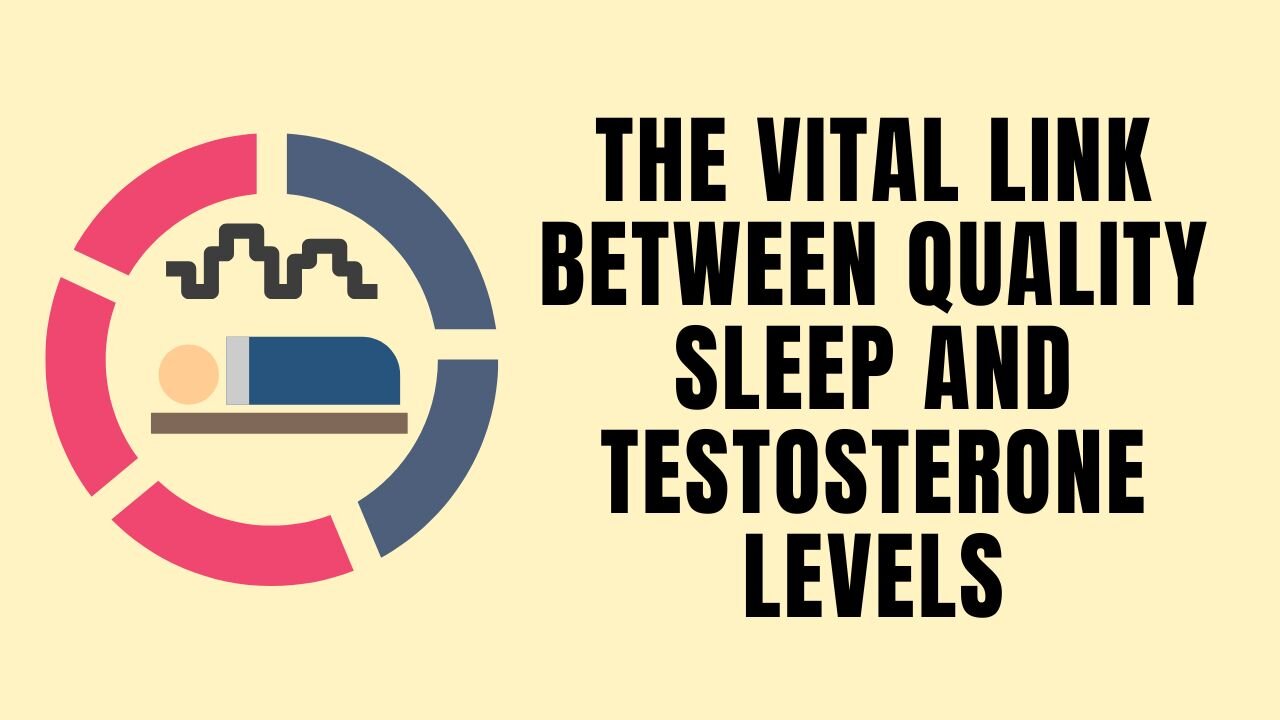Premium Only Content

The Vital Link Between Quality Sleep and Testosterone Levels Unveiling the Science Behind a Rested B
The Interplay Between High Blood Pressure and Testosterone Levels: A Comprehensive Analysis
Abstract:
High blood pressure (hypertension) and testosterone levels are two vital aspects of human health, each with significant implications for overall well-being. Research suggests a complex interplay between these two factors, with hypertension potentially exerting adverse effects on testosterone production and regulation. This article provides a thorough examination of the relationship between high blood pressure and testosterone levels, exploring the underlying mechanisms, clinical implications, and potential therapeutic interventions. By synthesizing existing literature and research findings, this comprehensive analysis aims to deepen our understanding of how hypertension impacts testosterone levels and offers insights into strategies for optimizing hormonal balance and cardiovascular health.
Keywords: high blood pressure, hypertension, testosterone levels, cardiovascular health, hormonal balance
Introduction:
High blood pressure and testosterone levels are essential components of human physiology, influencing various aspects of health and well-being. While hypertension is primarily associated with cardiovascular disease, emerging evidence suggests its potential impact on hormone regulation, particularly testosterone levels. Testosterone, a crucial hormone in both men and women, plays a significant role in reproductive health, muscle mass maintenance, cognitive function, and overall vitality. Understanding the relationship between hypertension and testosterone levels is of paramount importance, as it can have profound implications for clinical management and preventive strategies.
Overview of Hypertension and Testosterone:
Hypertension, characterized by elevated blood pressure levels persistently exceeding normal ranges, is a prevalent health condition affecting millions worldwide. It is a major risk factor for cardiovascular diseases such as heart attack, stroke, and heart failure. The etiology of hypertension is multifactorial, involving genetic predisposition, lifestyle factors (such as diet and physical activity), obesity, stress, and underlying medical conditions.
Testosterone, primarily known as a male sex hormone, is also present in smaller amounts in females and plays crucial roles in both sexes. In men, testosterone is primarily produced in the testes, while in women, it is synthesized in the ovaries and adrenal glands. Testosterone levels fluctuate throughout life, peaking during adolescence and early adulthood before gradually declining with age. Beyond its role in sexual function and development, testosterone influences muscle mass, bone density, mood regulation, cognitive function, and metabolic processes.
The Interplay Between Hypertension and Testosterone Levels:
Emerging research suggests a bidirectional relationship between hypertension and testosterone levels, with each potentially influencing the other. While the exact mechanisms underlying this interplay are still being elucidated, several pathways have been proposed:
Endothelial Dysfunction: Hypertension is associated with endothelial dysfunction, characterized by impaired vascular function and increased oxidative stress. Endothelial cells play a crucial role in regulating blood flow and vascular tone. Disruption of endothelial function may contribute to decreased testosterone production and bioavailability, potentially through impaired testicular blood flow and Leydig cell function.
Inflammatory Processes: Chronic inflammation is a common feature of both hypertension and testosterone dysregulation. Inflammatory cytokines, such as tumor necrosis factor-alpha (TNF-α) and interleukin-6 (IL-6), may inhibit testosterone synthesis by affecting the hypothalamic-pituitary-gonadal (HPG) axis and Leydig cell function. Conversely, low testosterone levels have been implicated in promoting inflammation and endothelial dysfunction, thereby exacerbating hypertension.
Neuroendocrine Imbalance: The hypothalamic-pituitary-adrenal (HPA) axis and HPG axis interact intricately, regulating stress response and reproductive function, respectively. Dysregulation of these axes may contribute to both hypertension and testosterone deficiency. Cortisol, the primary stress hormone, can inhibit testosterone production by suppressing gonadotropin-releasing hormone (GnRH) release from the hypothalamus and luteinizing hormone (LH) secretion from the pituitary gland.
Lifestyle Factors: Shared lifestyle factors, such as obesity, sedentary behavior, and poor dietary choices, contribute to both hypertension and testosterone imbalance. Obesity, in particular, is strongly associated with hypertension and is a known risk factor for hypogonadism (low testosterone levels). Adipose tissue, especially visceral fat, promotes inflammation and insulin resistance, further exacerbating hormonal and metabolic dysregulation.
Clinical Implications and Management Strategies:
-
 LIVE
LIVE
Vigilant News Network
14 hours agoUK Government BUSTED in Secret Plot to Extract Your Data | Media Blackout
1,703 watching -
 1:03:32
1:03:32
Winston Marshall
3 days ago"War On Children!" The DEMISE Of The West Starts With Schools - Katharine Birbalsingh
119K67 -
 48:02
48:02
Survive History
17 hours ago $8.11 earnedCould You Survive as a Sharpshooter in the Napoleonic Wars?
68.7K3 -
 12:03
12:03
Space Ice
17 hours agoSteven Seagal's China Salesman - Mike Tyson Knocks Him Out - Worst Movie Ever
50.8K17 -
 11:37
11:37
Degenerate Jay
17 hours ago $17.84 earnedJames Bond Needs Quality Over Quantity From Amazon
110K9 -
 15:23
15:23
Misha Petrov
17 hours agoTrad Wives & Girl Bosses Go to WAR!
81.7K46 -
 2:03:11
2:03:11
TheDozenPodcast
15 hours agoFootball villain fighting the state: Joey Barton
62.8K1 -
 13:18:50
13:18:50
Scottish Viking Gaming
18 hours ago💚Rumble :|: Sunday Funday :|: Smash the Blerps and Vape the Terpes
98.9K8 -
 1:45:00
1:45:00
RG_GerkClan
20 hours ago🔴LIVE Sunday Special - It's Time for World Domination - Civilization VII - Gerk Clan
90.6K28 -
 LIVE
LIVE
Major League Fishing
4 days agoLIVE Tackle Warehouse Invitationals, Stop 1, Day 3
82 watching